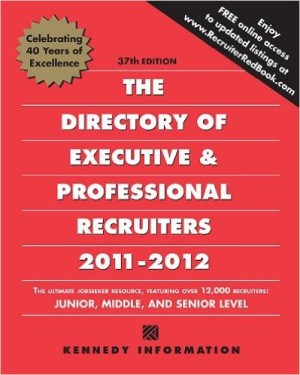Executive Search Firms Lists
How to Build Your Own
A trusted list of the best executive recruiting firms comes in handy whenever you have an important senior-executive opening but lack the right search firm to fill it. The are plenty of lists out there, but it is hard to determine which one offers reliable information without a hidden bias. In “What Top Executive Search Firms Lists Can You Trust?“, we analyze and assess a number of the top executive search firm lists. In this post, we give you guidance on how to build your own list.
Build Your Own Top Executive Search Firms List
Building your own top executive search firms list has become a necessity, if not a “best practice”. That’s because the recruiting industry’s go-to resource The Directory of Executive & Professional and Executive Recruiters by Kennedy Information is no longer being published.

In addition, it makes sense to build your top executive search firms list. You know best what kind of search firm you need. To assist in that effort, we have a few suggestions.
How to Identify the Top Executive Search Firms
To find the top executive search firms, apply 3 filters: the basics, the values, and the competitive advantage. Most firms that specialize in your sector will pass the basic screening questions. The values filter will winnow that list down to a shortlist of possible top search firms to use The competitive advantage questions will inform your selection so that you can pick the right search firm that outperforms all the others.
On the Internet, you’ll find checklists of screening questions to ask executive search firms to select the best ones. Does the executive search firm specialize in your industry or in the function of the position that needs to be filled? Check. Does the search firm have a good reputation and a strong track record of success? Check. Can the search firm recruit from your top target companies without any client blockage? Check. Does the search firm have the bandwidth to take on your search and fees you can afford? Check and check.
Additional questions to ask prospective executive search firm partners:
- Does your search firm have the capacity and geographical reach to handle our search?
- Do you specialize in our industry and sector? How so?
- What client references can you provide?
The only problem with the standard “what to look for in a search firm” checklist is that it still leaves you with a long list of search firms from which to choose. It does nothing to help you winnow down your list to the best choice. You do that by applying the next two filters.
Search Firm Values
You deserve an executive search partner you can trust. While the retained search industry has long been a relationship-driven business, these days corporate search buyers need more than a golf buddy or tennis partner. You deserve an executive search firm that, in action and in word, demonstrates it is to be trusted. We recommended filtering for firms that have eliminated percentage fees and that share candidate information.
Flat Fees
Traditional search firms charge a percentage of candidate compensation, which sets up a conflict of interest. Percentage fees provide a financial incentive for the firm to inflate the compensation of the candidates that they recruit. Even though the Association of Executive Search Consultants has a Code of Professional Practice that states “AESC members avoid conflicts of interest with clients and candidates.
Where a potential conflict may exist, members disclose and resolve those conflicts,” percentage fees remain an industry standard. Interestingly AESC changed the wording of that promise, which used to be called the Code of Conduct. It used to say, “AESC members will avoid, or resolve through disclosure and waiver, conflicts of interest”. Today’s code no longer promises to avoid conflicts of interest. However, there are firms that have eliminated that conflict and operate by flat fees. In addition to The Good Search, a handful of other firms charge flat fees including the global retained search Egon Zehnder.
Transparency
Traditional retained firms refuse to provide that candidate research, making it impossible to know what they have done or who they have contacted on your behalf. They often do so by claiming that information the information confidential, which is not true. There is a great deal of information that is not confidential — the kind of information you’d find on a basic business card — that they could report out to enable you to audit their work. Values questions to ask prospective executive search firm partners:
- Does your search firm charge a standard percentage fee? If yes, why do you charge a percentage when that sets up such an obvious conflict of interest?
- What target companies are clients of yours from which you cannot recruit? Are you willing to put that in writing?
- As a practice, do you provide clients with all the candidate research with contact information so that we can audit your work? If not, why not?
Competitive Advantage
Last, there are questions about the firm’s unique value proposition. The firm must be different enough to offer you a competitive advantage. Search firms that conduct an executive search the same way everyone else does — that have pretty much the same offerings and business model — lack the required ingredients for a competitive edge. When you use traditional executive search, you are using the same search firms and the same processes that your competitors use. Acting like your competitors is not how you gain the upper hand.
A Real Difference
Edge theory holds that change happens at the margins because it is free from the stifling orthodoxy of the center. In fact, experts have found that it is more efficient and valuable to innovate from the edge than from the center. While operating at the margins typically increases risk, for executive search firms, it holds the potential to do just the opposite. Because 40% of retained search engagements fail to complete, the biggest risk may lie in doing an executive search the same as everyone else — the same way it’s been done for decades To enjoy a competitive advantage, filter for executive search firms that search differently.
Of course, far too many search firms say they are different, but when you get right down to it they charge the same percentage fees and conduct searches pretty much the same way as before.
We advise looking for search firms that have gone through the trouble of improving on the traditional search model. The questions to ask include “What do you really do that’s different?” and “What expertise do you offer that I won’t find at other firms?”
Investigative Expertise for Dream Candidates
Executive search requires a new kind of expertise to harness the power of data. If research is the execution engine of search, then data is the rocket fuel. A treasure trove of candidate data exists outside traditional recruiting resume databases and LinkedIn. Moreover, data expertise is needed to wrangle the stunning amount of company, executive, and social network information. Increasingly, less qualified candidates are getting in the way of your perfect hire because recruiters can’t see the forest for the trees. Investigative expertise is needed to separate the signal from the noise.
Competitive advantage questions to ask prospective executive search firm partners:
- What does your search firm do differently?
- What expertise do you offer that I won’t find at other firms?
- What person on your team has investigative research expertise?
- What have you done to make the executive search process better?



Fantastic article!